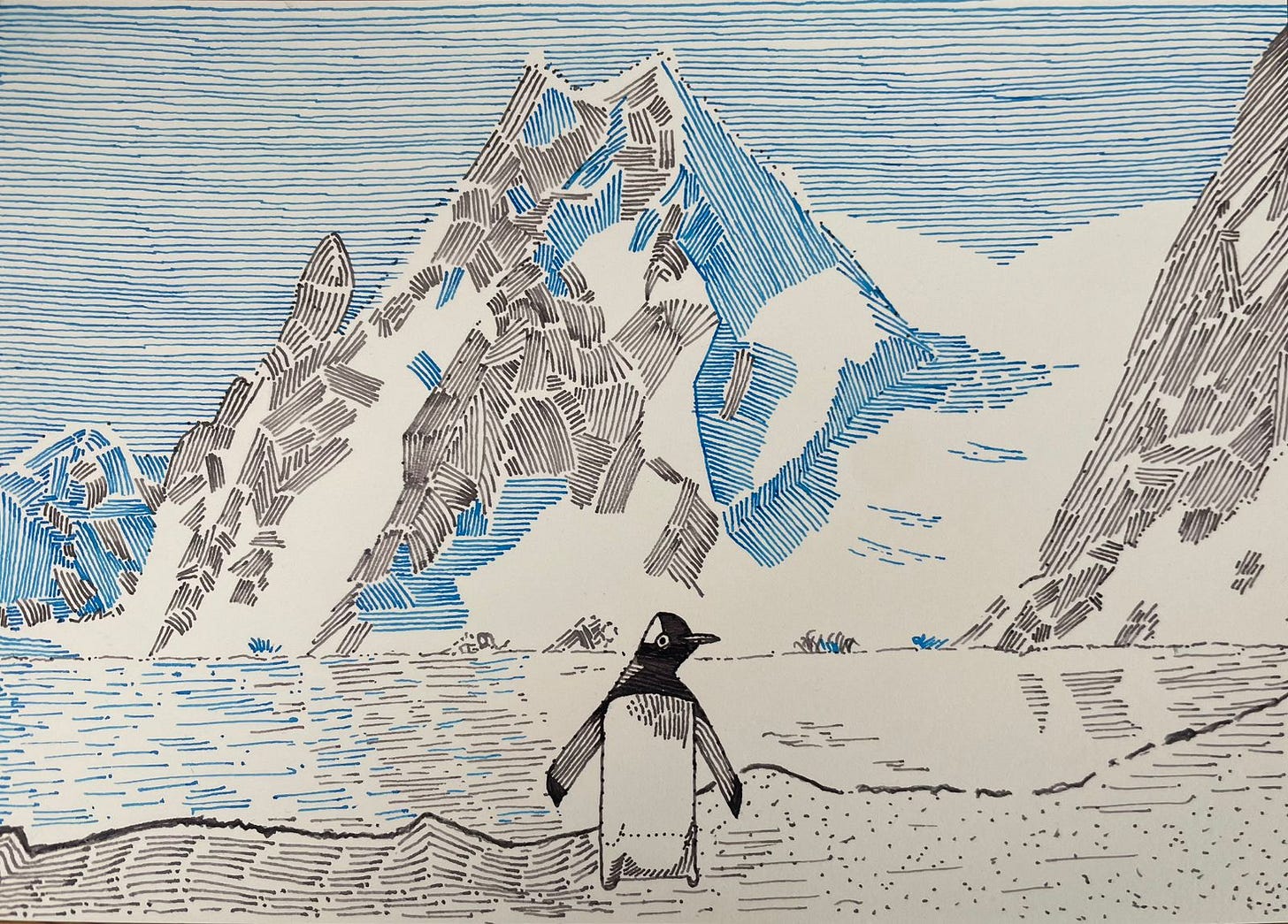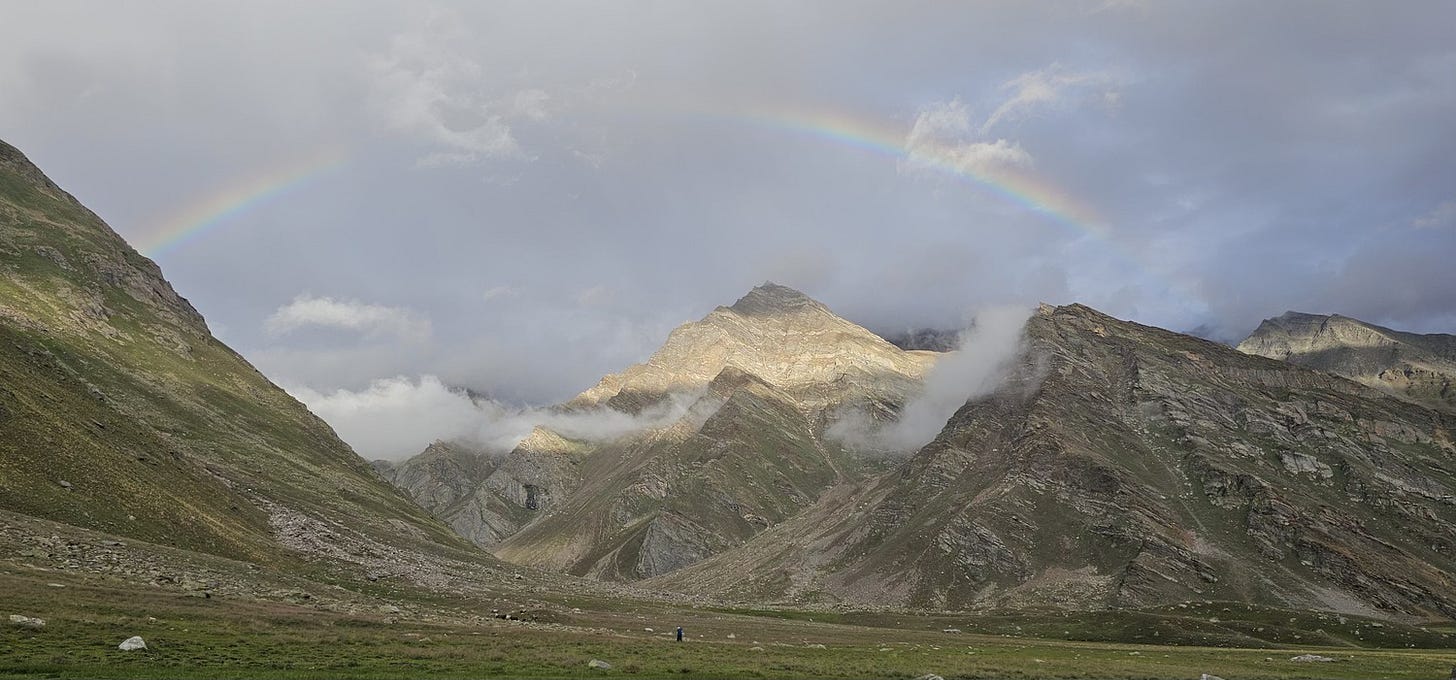This essay is part of a collaborative, constrained-writing challenge undertaken by some members of the Bangalore Substack Writers Group. Each of us examined the concept of ‘TIME’ through our unique perspective, distilled into roughly 400 words. At the bottom of this snippet, you’ll find links to other essays by fellow writers.

I looked up at the mountains in awe - their scale was immense and alien. How many thousands of years did it take for their intricate fingers to burst out of the ground, reaching desperately for the blue skies above?
We had walked for two days and still the same peaks stayed stubbornly in view. We crested hill after hill after hill - each one revealing the next long stretch of green for us to walk. I was struck by a sense of being removed from my own time and it was a most pleasant feeling.
To me, time is mechanical or non-mechanical.
Mechanical time is all our human constructs that we use to measure time passing. The hours on a clock, the events on your calendar, the days we designate as the weekend - they are abstract concepts we hold as solemn truth. Mechanical time is the shared fiction upon which we all coexist in society.
Non-mechanical time is the cycles we see passing in nature. The sun rising and setting every day, the moon changing phases over the months, the rainy season coming around every year with its abundance of sights and sounds and smells. Non-mechanical time is the physical reality that we can experience with our senses that reminds us of the world outside our elaborate mental fictions.
It's so easy for us to step into the flow of mechanical time and let go - the steady, consistent demarcation of our time into seconds, minutes, hours, days, years, soothes our certainty-craving brains. Yet in that certainty, we lose the natural ebb and flow of existence. Nature's cycles are long-term, slow, and uneven with rough edges.
Straight edges are of human design.
When we pay attention to the non-mechanical time in the natural world around us, we tune in to its rhythms. It gives us perspective and reminds us that we are single nodes in the complex, diverse, tangled web of life all around us.
The mountains stood for thousands of years before I saw them - and they will stand for thousands more after I am gone.
“So… When will shit actually hit the fan?” by Sailee, sunny climate stormy climate
Time: I Just Want to See It, Watch It Move by Abhishek Singh, The Comic Dreamer
Timekeepers - Retracing the Universe’s Deep-Time Signatures by Devayani Khare, Geosophy
Keeping Time by Reshma Apte, Fanciful Senorita
Locating Myself In The Map of Time by Priyanka Sacheti, A Home For Homeless Thoughts
The Thing We Pretend To Understand by Avinash Shenoy, OfftheWalls
The lost intimacy with time by Siddharth Batra, Siddharth’s substack
Lessons Time Taught Me by Aryan Kavan Gowda, Wonderings of a Wanderer
A Time for Worship by Vaibhav Gupta, Thorough and Unkempt
“Tata Mummy Tata” by Rakhi Anil, Rakhi’s Substack
The vicious cycle of sixteen - A dancer’s take on keeping time by Eshna Benegal, The Deep Cut
How long is twenty years? by Richa Vadini Singh, Here’s What I Think
How mystery writers play with the clock by Gowri N Kishore, About Murder, She Wrote
TIME INFLATED, JUSTICE DEFLATED. by Lavina G, The Nexus Terrain
What keeps the fool in me delighted by Rahul Singh, Mehfil
Time, please! by Shaili Desai - Litcurry





This is so beautifully written, Siddharth! I loved the visual of the mountains that have stood silent witness to the goings-on on this planet for millenia…reminded me of my trip to Leh, where seeing the majestic Himalayas in front of me, seemingly always a football field or 10 away from me made me realise my insignificance in the larger scheme of things. Certainly makes life so much more bearable when one realises how unimportant one really is!
Beautiful essay, Siddarth. There's something infinitely soothing about natural rhythms, even when we know our are mere seconds, in comparison.